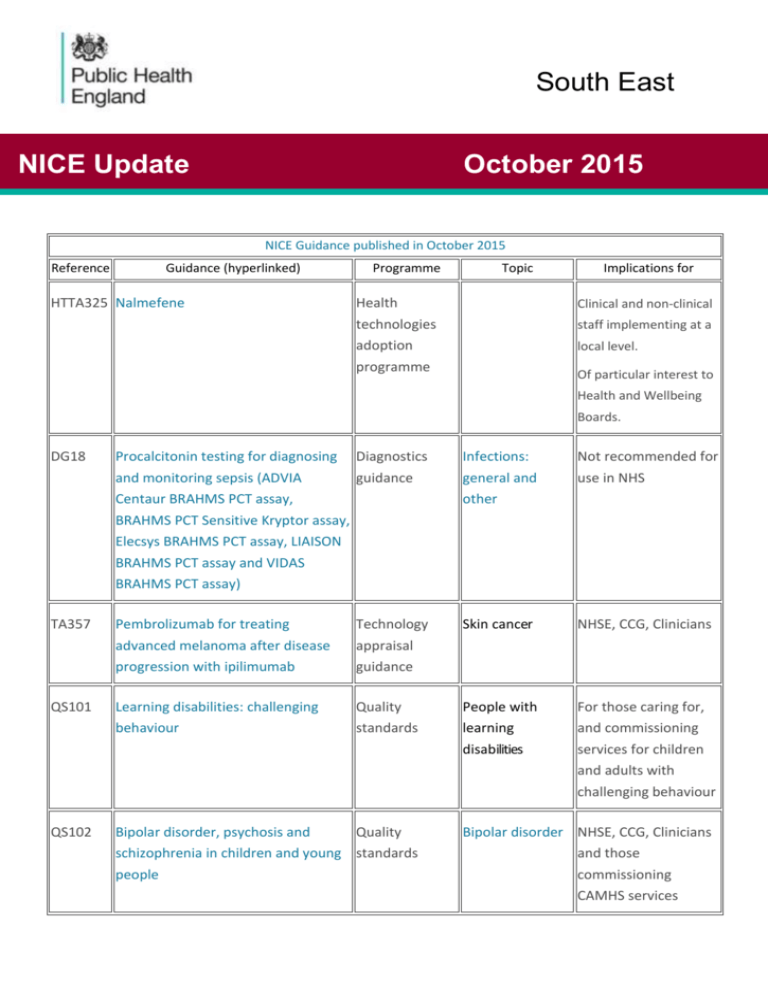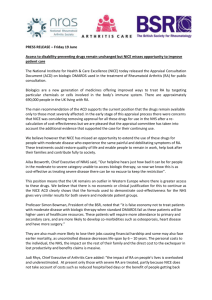NICE Update October 2015
advertisement

South East NICE Update October 2015 NICE Guidance published in October 2015 Reference Guidance (hyperlinked) HTTA325 Nalmefene Programme Topic Implications for Health Clinical and non-clinical technologies adoption programme staff implementing at a local level. Of particular interest to Health and Wellbeing Boards. DG18 Procalcitonin testing for diagnosing Diagnostics and monitoring sepsis (ADVIA guidance Centaur BRAHMS PCT assay, BRAHMS PCT Sensitive Kryptor assay, Infections: general and other Not recommended for use in NHS Elecsys BRAHMS PCT assay, LIAISON BRAHMS PCT assay and VIDAS BRAHMS PCT assay) TA357 Pembrolizumab for treating advanced melanoma after disease progression with ipilimumab Technology appraisal guidance Skin cancer NHSE, CCG, Clinicians QS101 Learning disabilities: challenging behaviour Quality standards People with learning For those caring for, and commissioning disabilities services for children and adults with challenging behaviour QS102 Bipolar disorder, psychosis and Quality schizophrenia in children and young standards people Bipolar disorder NHSE, CCG, Clinicians and those commissioning CAMHS services In development STA In development Kidney disease (autosomal dominant polycystic) - tolvaptan [ID652] Technology appraisal guidance Kidney conditions: general and other PHG In development Oral health promotion approaches for dental teams Guidelines Oral and dental health STA In development Psoriatic arthritis (active) apremilast (after-DMARDs) Technology appraisal Arthritis guidance MTA In development Ankylosing spondylitis and axial spondyloarthritis (non-radiographic) adalimumab, etanercept infliximab and Technology appraisal guidance Arthritis golimumab (inc rev TA143 and TA233) ID694 MTA In development Rheumatoid arthritis adalimumab, etanercept, infliximab, certolizumab pegol, golimumab, abatacept and tocilizumab review [ID537] Technology appraisal guidance Arthritis PHG In development Disability, dementia and frailty in later life - mid-life approaches to prevention Guidelines People with physical disabilities STA In development Leukaemia (chronic lymphocytic, previously treated) - idelalisib [ID764] Technology appraisal guidance Blood and bone marrow cancers In development STA In development Psoriasis (plaque, moderate to severe) - apremilast [ID679] Technology appraisal guidance Psoriasis PHG In development Tuberculosis (update) Guidelines Infectious disease prevention and control News Appointment of Core member to Public Health Advisory Committee NICE are recruiting Core members on our Public Health Advisory Committee. They are looking for people with a professional or practitioner background in the topic. If you or any of your colleagues would like to apply, there are more details on the NICE website. The deadline for applications is 04/11/15 at 17:00 time If you have any queries about Committee membership or the recruitment process, please contact Rukshana Begum PHMember@nice.org.uk NICE consultations A topic engagement exercise for transition between health and social care quality standard will run from 7th-21st December 2015. The NICE quality standards team develops a topic overview for each quality standard, based on the referral. The overview describes core elements of the standard, such as the population and condition or services to be covered, and lists the key source guidance that will be used to underpin the quality statements. At publication of the topic overview, NICE requests written submissions from QSAC specialist committee members, registered stakeholders and individuals asking them to: identify key areas for quality improvement highlight any national or routine indicators and performance measures not listed in the overview provide examples of published information on current practice (such as, reports of variation in care or service provision, evaluations of compliance with source guidance, or patient, carer or service user experience) to support the identified areas for quality improvement express interest in being an endorsing organisation. Further details will be sent at the start of the engagement period. For any further information on the quality standard or the quality standards programme in general please see the links below: Transition between health and social care Quality standard programme If you would like to register as a stakeholder for this quality standard please follow this link to find out more. Please note if you are submitting comments as an individual there is no need to register. NICE Health and Social Care Update Upcoming publications o Older people with social care needs and multiple long-term conditions o Transition between inpatient hospital settings and community or care home settings Committee Recruitment o Models of service delivery for people with learning disabilities and behaviour that challenges - guideline o Social care of older people with long term conditions - quality standard o Adults' experience of social care services - guideline Consultations o Preventing excess winter deaths and morbidity - draft quality standard o Adults' experience of social care services - draft guideline scope NICE Fellowships & Scholarships Stakeholder registration Angela Baker Deputy Director, Health and Wellbeing Public Health England, South East Mobile Telephone: 07825 356656 angela.baker@phe.gov.uk Key and Definitions https://www.nice.org.uk/about/what-we-do Code TA Guidance Type Technical Appraisal Notes Technology appraisals assess the clinical and cost effectiveness of health technologies, such as new pharmaceutical and biopharmaceutical products, but also include procedures, devices and diagnostic agents. This is` to ensure that all NHS patients have equitable access to the most clinically - and costeffective treatments that are viable. QS Quality Standard Quality Standards are concise sets of statements, with accompanying metrics, designed to drive and measure priority quality improvements within a particular area of care. They are derived from the best available evidence, particularly NICE's own guidance and, where this does not exist, from other evidence sources accredited by NICE. NG NICE Guidance CG Clinical Guidance IPG Interventional Procedures Guidance MTG Medical Technologies Guidance NICE guidelines make evidence-based recommendations on a wide range of topics, from preventing and managing specific conditions, improving health and managing medicines in different settings, to providing social care to adults and children, and planning broader services and interventions to improve the health of communities. They aim to promote integrated care where appropriate, for example, by covering transitions between children’s and adult services and between health and social care Interventional procedures guidance recommends whether interventional procedures, such as laser treatments for eye problems or deep brain stimulation for chronic pain are effective and safe enough for use in the NHS. Medical technologies and diagnostics guidance help to ensure that the NHS is able to adopt clinically and cost effective technologies rapidly and consistently.







